|
Progressive
Men of Iowa
1899
Progressive Men Index
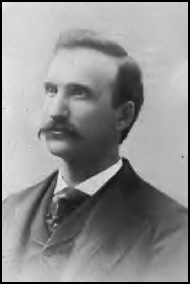 BURTON, Asa Huntington, city
attorney of Sioux City, is another addition to the long list
of successful Iowa men who came from New England stock. His
father was Alonzo Hazen Burton, born in Vermont in 1827. In
1846 he came, with his parents, to Denmark, Lee county, Iowa,
and located on a farm. He was married to Miss Caroline Louise
Ingalls, youngest daughter of Rev. Edmund Ingalls, a
Presbyterian minister from western New York, and located near
Denmark, Iowa, November 1, 1854, and remained on his farm in
that county, until his death, May 14,1893. They had three
children: Edmund Ingalls, born January 25, 1858; Asa
Huntington, born August 9, 1861, and Eugene Henry, born August
1, 1863; all now living. They lived very comfortably, in a
pleasant country home. The families date back eight
generations in America, and on both sides members have
attained high rank in public and private life. BURTON, Asa Huntington, city
attorney of Sioux City, is another addition to the long list
of successful Iowa men who came from New England stock. His
father was Alonzo Hazen Burton, born in Vermont in 1827. In
1846 he came, with his parents, to Denmark, Lee county, Iowa,
and located on a farm. He was married to Miss Caroline Louise
Ingalls, youngest daughter of Rev. Edmund Ingalls, a
Presbyterian minister from western New York, and located near
Denmark, Iowa, November 1, 1854, and remained on his farm in
that county, until his death, May 14,1893. They had three
children: Edmund Ingalls, born January 25, 1858; Asa
Huntington, born August 9, 1861, and Eugene Henry, born August
1, 1863; all now living. They lived very comfortably, in a
pleasant country home. The families date back eight
generations in America, and on both sides members have
attained high rank in public and private life.
Asa H. had about the usual life of a farmer's son. He
went to school in the district school until he was 11 years
old, when he worked on the farm during the busy season, and
went to the academy in Denmark in the fall and winter, riding
back and forth on horseback between the town and his father's
home, where he boarded. When about 18 years of age he
commenced teaching, and doing other work around the academy,
graduating from that institution, in the classical course, in
June, 1883. Having determined to be a lawyer, he commenced
studying with that end in view at once, and in the winter of
1884 entered the law department of the State university,
graduating in June, 1885, with the degree of LL. B. After
helping his father out with the summer's work on the farm, Mr.
Burton located temporarily in the little town of Elliott,
Montgomery county, for the practice of law, and here he
received his first professional earnings, which he remembers
was for drawing some instruments of conveyance. Learning of
the fine opening in the rapidly-growing and prosperous Sioux
City, the young lawyer remained only six months in Elliott,
when he removed to his present residence, where he has since
practiced successfully. He was in partnership with Thomas F.
Bevington from May, 1886, to September, 1890, when he
purchased Mr. Bevington's interest, and continued alone until
he formed a partnership with George Conway, in May, 1893. This
lasted one year, when it was dissolved, and Mr. Burton has
practiced alone since. In March, 1894, his professional
ability was recognized by an election to the office of city
attorney of Sioux City, and his work in that position was so
satisfactory that he was re-elected in 1896; both times on the
republican ticket, for he has always voted with the republican
party.
Mr. Burton has always been a close student of military
tactics, having been teacher and captain of the Denmark
Guards, at Denmark academy, and has shown his willingness to
respond to the demands of his country by serving almost six
years in the Iowa National Guard being a member of Company H,
of Sioux City, Fourth regiment. He is a member of Sioux
Council No. 1308, Royal Arcanum, Sioux City. He was married
September 20, 1888, to Helen S. Turner, only child of Mr. and
Mrs. Louis Q. Turner, of Denmark, Iowa. Daughters were born to
them, October 26, 1892, named Adelene and Caroline. The latter
died when but 2 days old.
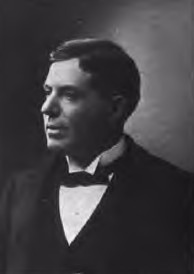 CONNIFF, Robert E., president
of the state board of health, is a resident of Sioux City,
Iowa, where he is well known as one of the leading physicians
of the state. He was born at Houston, Minn., in 1858, and came
to Iowa in 1869. He graduated from the State University of
Iowa in 1884, where he completed his professional studies in a
most creditable manner, after which he located at Sioux City,
where he has since been engaged in the active practice of
medicine. He has developed an increasing love for his
profession, and his one aim in life is to reach the top. He
does not aspire to mix extensively in politics, nor does he
seek political preferment, although he was appointed by
Governor Boies a member of the state board of health, a
political appointment, and has held that position under three
republican governors up to the present time. As a member of
the board of health he has been a constant and efficient
worker in the field of preventive medicine and sanitation. He
is a member of a number of medical societies, among others,
the American Medical association, the Iowa State Medical
society, American Public Health association. CONNIFF, Robert E., president
of the state board of health, is a resident of Sioux City,
Iowa, where he is well known as one of the leading physicians
of the state. He was born at Houston, Minn., in 1858, and came
to Iowa in 1869. He graduated from the State University of
Iowa in 1884, where he completed his professional studies in a
most creditable manner, after which he located at Sioux City,
where he has since been engaged in the active practice of
medicine. He has developed an increasing love for his
profession, and his one aim in life is to reach the top. He
does not aspire to mix extensively in politics, nor does he
seek political preferment, although he was appointed by
Governor Boies a member of the state board of health, a
political appointment, and has held that position under three
republican governors up to the present time. As a member of
the board of health he has been a constant and efficient
worker in the field of preventive medicine and sanitation. He
is a member of a number of medical societies, among others,
the American Medical association, the Iowa State Medical
society, American Public Health association.
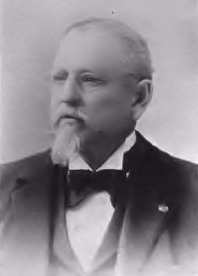 FLETCHER, Charles W., ex-mayor of Sioux City, and
president and manager of the large manufacturing establishment
of Fletcher & Hutchins company at that place, was born at
Pittsburg, N. H., June 30, 1837. His father was a pioneer
farmer of northern New Hampshire, well educated, industrious
and fairly successful in the accumulation of wealth. The
mother was a daughter of Judge Cummings, of Canaan, Vt., and
the effects of early culture were shown throughout her whole
life. Grandfather Ebenezer Fletcher settled at Charlestown, N.
H., and there followed the a vocation of carpenter;
Great-grandfather Peter Fletcher was a soldier in the
revolutionary war, and Great-great-grandfather Ephraim
Fletcher served in the French war until captured by the
Indians, after which he was never heard
from. FLETCHER, Charles W., ex-mayor of Sioux City, and
president and manager of the large manufacturing establishment
of Fletcher & Hutchins company at that place, was born at
Pittsburg, N. H., June 30, 1837. His father was a pioneer
farmer of northern New Hampshire, well educated, industrious
and fairly successful in the accumulation of wealth. The
mother was a daughter of Judge Cummings, of Canaan, Vt., and
the effects of early culture were shown throughout her whole
life. Grandfather Ebenezer Fletcher settled at Charlestown, N.
H., and there followed the a vocation of carpenter;
Great-grandfather Peter Fletcher was a soldier in the
revolutionary war, and Great-great-grandfather Ephraim
Fletcher served in the French war until captured by the
Indians, after which he was never heard
from.
The early education of Charles W. Fletcher was acquired
in a rude country schoolhouse, roughly seated and in which few
text books were used. From that time until the outbreak of the
civil war he was engaged as trapper, bookkeeper, traveling
agent, railroad agent and merchant, respectively. In April,
1861, he enlisted in the Second New Hampshire infantry,
serving as fourth sergeant He was disabled at the first battle
of Bull Run and upon his partial recovery was sent to
Lancaster, N. H.,
to do duty in the recruiting service. After peace had been
declared he came to Iowa and located at Charles City, and
engaged in the general merchandise business for five years,
then lumber for ten years, then boots and shoes until 1882, at
which time he located in Sioux City and assisted in the
establishment of the concern of which he is now the president.
The Fletcher & Hutchins company conducted their business
at first under the firm name of Andrews & Fletcher, and
employed about twelve hands. Some years ago the company was
reorganized and incorporated and a new plant erected with a
capacity sufficient for the employment of eighty men. The
establishment receives the personal attention of the president
and manager in its every detail. As manufacturers of bank
counters and fine store fixtures, stair work, church
decorations in fine woods, mouldings and all the common stock
used by lumber dealers they have a reputation extending
throughout the west.
Mr. Fletcher is an Abraham Lincoln republican. His
convictions have continued to grow stronger since the time
when he cast his first vote for "Father Abraham " and his
courage has kept pace with that growth. He declares his views
upon all proper occasions and leaves nothing un-done to
promote the interests of his party. The only political
positions held by him have been ones of sacrifice rather than
renumeration. At the expense of his personal interests he
served for three terms as mayor of Charles City and for one
term as mayor of Sioux City. He is a ruling elder in the First
Presbyterian church and a member of the Grand Army of the
Republic. In all movements of a charitable character he is
foremost and his purse is not kept open for the notoriety of
such a course, but because of a kindly and generous nature, to
whom the doing of good deeds is in itself a satisfaction and a
pleasure. He was married at Prairie du Sac, Wis., August 18,
1864, to Miss Carrie E.
Moore. They have two children Jessie M., who is the
wife of L. L. Redding, of Brooklyn, N. Y., and Ralph M.,
book-keeper in the establishment of Fletcher & Hutchins
company.
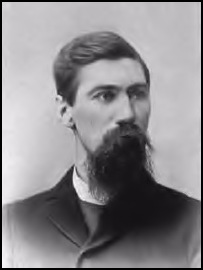 HANCHETTE, Dr. John L., of Sioux City, is president
of the Hahnemann Medical association of Iowa, and one of the
leading homeopathic physicians of the west. He came of a
family of physicians, three of his four brothers being
physicians. A. P., referred to elsewhere in this work, is at
Council Bluffs; W. H. is at Omaha and J. C. is at Salt Lake.
The other brother, F. G., is a lawyer in Aurora, 111. Their
one sister is Mrs. Clark Ravlin, of La Porte, Iowa. HANCHETTE, Dr. John L., of Sioux City, is president
of the Hahnemann Medical association of Iowa, and one of the
leading homeopathic physicians of the west. He came of a
family of physicians, three of his four brothers being
physicians. A. P., referred to elsewhere in this work, is at
Council Bluffs; W. H. is at Omaha and J. C. is at Salt Lake.
The other brother, F. G., is a lawyer in Aurora, 111. Their
one sister is Mrs. Clark Ravlin, of La Porte, Iowa.
Dr. John L. is a son of David and Fayette Churchill
Hanchette, and was born and brought up on a farm near
Kaneville, 111. He comes of sturdy old New England stock. He
remained on the home farm, getting what education he could in
the schools of that vicinity till he was 21 years old, when he
removed to Parker, S.
D., and farmed on his own account five years, being
married in the meantime, before he began to study medicine. He
took a course in the University of Chicago, and graduated with
high honors from the Chicago Homeopathic Medical college in
1889. He was the
valedictorian of his class. Armed with his
diploma, good health and courage he went at once to Avoca,
where he intended to locate, but within a month he decided
that Sioux City offered a better field, as it was then in the
height of its financial glory and held out rich promise to the
young and energetic. Dr. Hanchette's judgment has been proved
unerring by the success that has attended his practice in
Sioux City, where he has risen to a position of comfort and
distinction, as his election to the presidency of the state
organization of his school of medicine attests. He is also a
member of the American Institute of Homeopathy. The
repub-lican party represents his political views, and he has
always supported it.
Dr. Hanchette was married in Parker, S. D., May 20,
1885, to Miss Maria Louise Stevens. They have three children:
Anna Fayetta, born July 5,1886; Ralph, W., born July 16, 1888,
and James Harold, born September 29, 1890. The family belongs
to the Baptist church.
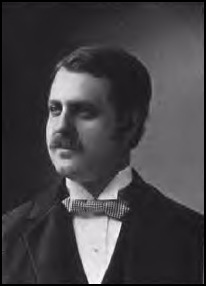 HOYT, William Henry, M. D.,
one of the prominent physicians of Sioux City, was born in
Northfield, Vt., April 27, 1862. He is the son of
Samuel Norris Hoyt, who superintended for years the wood
construction for the Vermont Central railroad, and later had
charge of the carpenter department of the Nashua Manufacturing
company, at Nashua, N. H. His brothers are natives of the
Green Mountain state, living in the vicinity of Peachem Hollow
and Hardwick. The mother's maiden name was Mary Jane Ford, a
native of Bangor, Me., but subsequently a resident of
Hardwick, Vt. HOYT, William Henry, M. D.,
one of the prominent physicians of Sioux City, was born in
Northfield, Vt., April 27, 1862. He is the son of
Samuel Norris Hoyt, who superintended for years the wood
construction for the Vermont Central railroad, and later had
charge of the carpenter department of the Nashua Manufacturing
company, at Nashua, N. H. His brothers are natives of the
Green Mountain state, living in the vicinity of Peachem Hollow
and Hardwick. The mother's maiden name was Mary Jane Ford, a
native of Bangor, Me., but subsequently a resident of
Hardwick, Vt.
Doctor Hoyt moved to Nashau with his parents in 1867.
He at once entered the public schools, continuing in the same
until the spring of 1881, when he was honorably graduated,
receiving the Noyes prize medal as one of the leaders in his
class in scholarship and deportment for the four years' high
school course.
During his boyhood days, the first money earned by his
own efforts was while acting as a newsboy for a local paper of
large circulation. Thus was started early a wish to be
independent, to pave the way for his own future college
education, and so in many ways, during his school vacations,
he added to his first small earnings. In this he was very
successful.
Having conceived at an early date a choice of the
medical profession as his future career, he engaged in the
drug business, at the completion of his studies in the high
school, as a preliminary step to the years of college work
necessary to acquire a medical
education.
In the fall of 1882 he entered the medical department
of the University of the City of New York, graduating with
honors in the spring of 1886. He then pursued a valuable and
instructive course of surgical and practical medicine by
accepting the position of resident physician of the
institutions of Westchester county, located near Tarrytown, on
the Hudson river.
In 1887 he located in Sioux City, Iowa, through the
influence of eastern capitalists, and at once assumed the
responsibilities of the active practice of medicine. Becoming
well-known and popular through county as well as city, in 1893
he received the nomination for county coroner, and was elected
to that office by a remarkable majority. In 1895 he was made
the unanimous choice of the republicans and a second time was
easily elected.
Dr. Hoyt, in professional circles, enjoys a high
standing, and in the different medical societies and
associations is regarded as a valuable member. He still
retains his membership with the Granite Lodge, I. O. O. F., of Nashua, N.
H.
June 24, 1896, he was married to Dr. Katherine E. Prichard,
of Nashua, N. H., a native of Bradford, Vt. She is a graduate
of the Women's Medical college of New York city, and engaged
in active practice in Nashua, and later in the New England
hospital, of Boston. They are both members of the First
Congregational church.
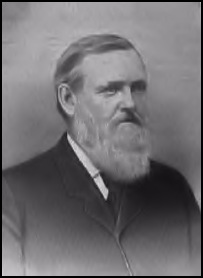 JOY, William L., has been a
resident attorney of Sioux City since 1857. He stands out
conspicuously as a Woodbury county pioneer and for many years
he has been the leading lawyer of northwestern Iowa, where
through a legitimate and honorable practice of his profession,
together with prudent investments, he has made a financial
success. It is said by his friends to his credit, that he uses
the fortune he has accumulated for the true purposes that a
goodly competency is given to men. He is not only an able
lawyer, holding the respect and high esteem of the bar of the
state, and of his neighbors, but is an active, public-spirited
man, representing the best type of American citizenship.
Having a kind heart and being a candid man, he has many
friends and admirers. JOY, William L., has been a
resident attorney of Sioux City since 1857. He stands out
conspicuously as a Woodbury county pioneer and for many years
he has been the leading lawyer of northwestern Iowa, where
through a legitimate and honorable practice of his profession,
together with prudent investments, he has made a financial
success. It is said by his friends to his credit, that he uses
the fortune he has accumulated for the true purposes that a
goodly competency is given to men. He is not only an able
lawyer, holding the respect and high esteem of the bar of the
state, and of his neighbors, but is an active, public-spirited
man, representing the best type of American citizenship.
Having a kind heart and being a candid man, he has many
friends and admirers.
Mr. Joy is a New Englander by birth and education. His birthplace was
Townshend, Vt., and the date August 17, 1830. His parents were
William H. and Hetty Leonard Joy. His father was a
farmer, who also owned a mill. His paternal grandfather was a
revolutionary soldier.
William L. remained at home till he was 20 years old,
assisting his father in his business and fitting himself for
college in Leland seminary in his native town. In his 21st
year he entered Amherst college and graduated in the class of
1855. During his college course he taught several terms of
school, being an instructor in Leland seminary while studying
law with Judge Roberts at home. He was admitted to the bar
early in the spring of 1857 and started immediately for the
great, growing west to make his fortune. He reached Sioux City
on the 5th of May.
He found there a small village on the frontier, with no
sign of a railway, but full of energetic young men like
himself, with unbounded hopes for the future and the courage
and industry to do their part in developing a country of rare
promise. Mr. Joy
formed a partnership with N. C. Hudson and the firm of Hudson
& Joy was continued until October, 1866. After practicing
alone for two years he took as a partner Craig L. Wright, son
of the late George G. Wright, and for twenty years the firm of
Joy & Wright was the leading law firm in Woodbury county.
They were the local attorneys for the Illinois Central Railway
company and the general attorneys for the Sioux City &
Pacific, the Dakota Southern, the Covington, Columbus &
Black Hills railway companies and the Iowa Falls & Sioux
City Railroad Land company. Mr. Joy has always had a
large law business, both in the state and federal courts. His
son, C. L. Joy, was taken into his father's firm in 1888, when
it was known as Joy, Hudson & Joy, A. L. Hudson being the
other partner. Later the firm was Joy, Hudson, Call & Joy,
A. F. Call, of Algona, having been admitted as a partner. The
firm at present is W. L. and C. L. Joy. The younger Mr. Joy
has earned a high standing at the bar. The senior Mr. Joy has
always been regarded as a strong pleader before a jury, but is
best known as a court lawyer, and as such has but few equals
in the state.
Mr. Joy has always been a staunch republican. He was a
member of the lower house in the Eleventh and Twelfth General
Assemblies and spent most of his time in Des Moines during the
session of the Thirteenth General Assembly, in 1868, looking
after legislation for the purpose of securing railways for
northwestern Iowa. In this capacity he probably did as much
work for his constituents as any member of the legislature,
for the legislation he secured has been of inestimable benefit
to that part of the state. Having accomplished this work, Mr.
Joy has since refused the solicitations of friends to become a
candidate for any office, though he served two years as a
member of the board of capitol commissioners during the
inception of the great enterprise of building the state house.
Friends urged him to be a candidate for district or circuit
judge, a position he was peculiarly well qualified to fill,
but he never encouraged such movements.
Mr. Joy
has been a prominent member of the Baptist church for more
than forty-two years. He was married October 18, 1859, to
Frances A. Stone, of Westmoreland, N. H. They have two
children, the elder, C. L., the lawyer, and Helen F., wife of
Giles W. Brown, general manager of the Sioux Milling company,
of which Mr. Joy is president. Mr. Joy has always been deeply
interested in school matters, and for more than twenty years
he gave his valuable time and business experience to the
school board of Sioux City, as member and president. To the
wise management given the district's affairs by these
directors, who included some of the most prominent citizens of
the city, is due the excellent condition of the public schools
and most of the valuable property owned by the district. Mr.
Joy was president of the Sioux National bank, the heaviest in
Sioux City, from its organization until January, 1896. He has
been a stockholder and otherwise connected with various
financial institutions in Sioux City, that have felt the
impress of his ability. He is a strong man, physically,
mentally and morally, takes an active interest in all public
enterprises for the improvement of the city, and it has been
fortunate in having such a man among its early settlers. His
has been the work of helping to lay a solid foundation for a
great and growing city.
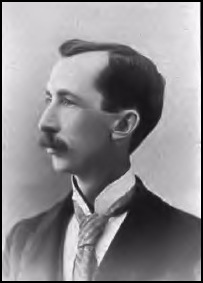 KELLY, John Charles, the
well-known editor of the Sioux City Daily Tribune, is a native
of the " Empire State. " He was born in Cortland, N. Y., on
the 26th of February, 1852. His mother's maiden name was Mary
Kelly, and his father's name was Thomas C. Kelly, but they
were of different families and types, although both were
natives of Ireland, and well educated in youth. His
grandfather on his fathers side, was a business man, and on
the mother's side a farmer. John C.'s grandmother, on his
mother's side, was a Scotch woman. His father's education was
completed at the University of Edinburgh, after which he spent
some years in travel. Two of his father's brothers held
commissions in the British army, but Thomas was educated for
civil life, and came to the United States in December, 1849.
His wife's people were farmers, in the state of New York, and
he engaged in the same occupation soon after he reached
America. Upon the opening of the civil war, and in response to
President Lincoln's first call for volunteers, Thomas C.
tendered his services to his adopted country, and, raising a
segment of a company, received a lieutenant's commission. He
had become a citizen of the republic as soon as its laws
permitted, and took a deep interest in public affairs, allying
himself with the Douglas wing of the democratic party. When
his father entered the union army, John C. was not 10 years old,
and, although a mere schoolboy, he undertook to manage his
father's large farm, but soon found it too formidable an
undertaking for a youth of his years. KELLY, John Charles, the
well-known editor of the Sioux City Daily Tribune, is a native
of the " Empire State. " He was born in Cortland, N. Y., on
the 26th of February, 1852. His mother's maiden name was Mary
Kelly, and his father's name was Thomas C. Kelly, but they
were of different families and types, although both were
natives of Ireland, and well educated in youth. His
grandfather on his fathers side, was a business man, and on
the mother's side a farmer. John C.'s grandmother, on his
mother's side, was a Scotch woman. His father's education was
completed at the University of Edinburgh, after which he spent
some years in travel. Two of his father's brothers held
commissions in the British army, but Thomas was educated for
civil life, and came to the United States in December, 1849.
His wife's people were farmers, in the state of New York, and
he engaged in the same occupation soon after he reached
America. Upon the opening of the civil war, and in response to
President Lincoln's first call for volunteers, Thomas C.
tendered his services to his adopted country, and, raising a
segment of a company, received a lieutenant's commission. He
had become a citizen of the republic as soon as its laws
permitted, and took a deep interest in public affairs, allying
himself with the Douglas wing of the democratic party. When
his father entered the union army, John C. was not 10 years old,
and, although a mere schoolboy, he undertook to manage his
father's large farm, but soon found it too formidable an
undertaking for a youth of his years.
His education, up to this time, had been such only as
the country district schools afforded. But the instruction
given by his father at home was found in after life to be of
more practical value than that imparted at school. John had a
strong desire to get into the union army in some capacity, and
went on to Washington in 1862, arriving in the city in time to
witness "McClellan's Grand Review, " but his youth thwarted
this desire.
During the war he had but two short terms at school,
and after its close he had three months' instruction in a
grammar school in Washington. His father was disabled during
the war, and the boy found himself the chief support of the
family, whose fortunes had been wrecked. He secured employment
in stores at the national capital, and spent the late
evenings, generally up till midnight, in study. Under this
strain he finally broke down. In December, 1869, his father
died, and soon after John secured a position in the government
printing office, where it was thought his health might be
recruited. He made such progress in acquiring a knowledge of
the art of printing, stereotyping and electrotyping that,
while he had yet a year of the prescribed apprenticeship
unserved, he was chosen by Mills & Company, then state
printers, at Des Moines, Iowa, to purchase a plant for them,
and to come on to the state capital and superintend it. On the
23d of May, 1873, John C. Kelly, then 21 years of age, crossed
the Mississippi river, came to Des Moines and entered upon the
responsible duties of his new position at a salary of $30 a
week. He served more than three years with Mills &
Company, and has ever since reckoned the surviving members of
the firm among his best friends. While in their employ he
divided and numbered the streets of Des Moines on the
"Philadelphia plan," it being the first city in Iowa so
divided. Mr.
Kelly was the pioneer in organizing the first Building
association in Iowa. It was established by him at Des Moines,
and he became its secretary. Associated with him in the
directory were such men as T. S. Wright, Adam Howell
and L. Harbach.
In Des Moines Mr. Kelly first met Miss Martha A. Hill,
daughter of Col. S. G. Hill, of the Thirty-fifth Iowa
infantry, who was killed while leading his regiment at the
battle of Nashville. Miss Hill and Mr. Kelly were married at
the home of her mother in Muscatine, May 1, 1878. It was a
very happy union, and seven children came to make the home an
ideal one. Of these, Martha died, while Rose, Mabel, Rachel,
John H., Eugene and Gardner are living.
Mr. Kelly read law, while living in Des Moines, with
Judge William Connor, and also engaged in merchandising, but
eventually purchased an interest in the Daily State Leader, of
which he became one of the editors. Three years later he
disposed of his interest in that paper, and, removing to Sioux
City, he purchased the weekly Tribune of that place. In 1884
he established the Sioux City Daily Tribune, of which he is
editor and proprietor. During the same year he established the
Sioux City Printing company, which has grown into a large
manufacturing establishment, dealing in printers' supplies,
and doing auxiliary publishing, of which enterprise he is the
principal owner and general manager.
In 1893 he was appointed collector of internal revenue
by President Cleveland, and also disbursing agent of the
treasury department. Mr.
Kelly was always a "hard-money" man, and is an advocate
of the single gold standard. He was a member of the first free
trade or tariff reform club organized after the war. He has
for many years been a member of the Reform club, of New York,
and a warm advocate of civil service reform. He was a delegate
at large to the democratic national convention of 1888, which
nominated Cleveland and Thurman. In 1892 Mr. Kelly
supported Governor Boies, in the national democratic
convention, as a candidate for president. In 1896 he refused
to support Bryan for president on the "free coinage" platform,
and was a delegate to the national democratic convention which
nominated Palmer and Buckner. He has served on the committee
on resolutions in ten democratic state conventions. He is not a member of
any fraternity or church, but since his marriage has, with his
wife, attended the Congregational church. He was for many
years president of the Humane society, of Sioux
City.
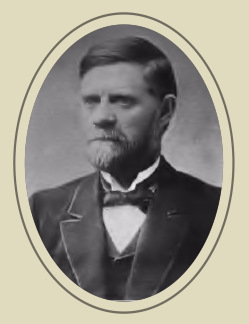 LEWIS, Judge Charles Henry.
The life of this honorable and honored citizen of Woodbury
county as citizen, soldier, jurist and judge, stands a shining
example of combined American attributes. He was born October
17, 1839, in Collins Center, Erie county, N. Y. His parents
Oren and Elizabeth Nichols Lewis, were natives of Connecticut,
descended from English ancestors. When he was but 9 months old
the family moved to southern Wisconsin, where they remained
for two years, and thence went to Boone county, 111. They made
their home there until 1851, when they came to Iowa, arriving
at Independence October 8. Three years later the father moved
to Quasqueton, Buchanan county, this state, where he remained
until his death, which occurred in 1884. Judge Lewis' early
life was spent upon his father's farm, save for a little time
when he was employed in the furniture factory operated by the
father at Independence.
In 1859 he began a close student's life in Cornell
college, at Mount Vernon. LEWIS, Judge Charles Henry.
The life of this honorable and honored citizen of Woodbury
county as citizen, soldier, jurist and judge, stands a shining
example of combined American attributes. He was born October
17, 1839, in Collins Center, Erie county, N. Y. His parents
Oren and Elizabeth Nichols Lewis, were natives of Connecticut,
descended from English ancestors. When he was but 9 months old
the family moved to southern Wisconsin, where they remained
for two years, and thence went to Boone county, 111. They made
their home there until 1851, when they came to Iowa, arriving
at Independence October 8. Three years later the father moved
to Quasqueton, Buchanan county, this state, where he remained
until his death, which occurred in 1884. Judge Lewis' early
life was spent upon his father's farm, save for a little time
when he was employed in the furniture factory operated by the
father at Independence.
In 1859 he began a close student's life in Cornell
college, at Mount Vernon.
In 1862 he left the school and enlisted in the army,
entering the services as a private soldier in Company H,
Twenty-seventh Iowa infantry. For a year he served as a
private soldier, was then made sergeant-major of the regiment,
and held that position for one year, when he was promoted to
first lieutenant, and appointed and commissioned adjutant,
which position he filled until the war closed. He served three
years and five days, and during all that time was never absent
from the regiment, and was off duty but three days, during
which time he was on the sick list The war closing, he
returned to his old home in Buchanan county, and soon engaged
with his brother, and another in the milling and mercantile
business, which he pursued for a little time.
He then entered the law department of the State
university, and graduated therefrom in the summer of 1869. He
at once removed to Cherokee, Iowa, arriving there May 29th of
that year, and formed a partnership with his father-in-law, H.
C. Kellogg. They were the first lawyers in the county, and
their practice was soon extensive and lucrative. Mr. Lewis was
county recorder and county superintendent of schools of
Cherokee county, for a time. In 1870 he was nominated district
attorney of the Fourth judicial district of Iowa, the district
then embracing twenty two counties in northwestern Iowa. He
was elected by a large majority. He served as such until
January 1, 1875. So well had Mr. Lewis performed his duties as
district attorney, that in the summer of 1874 he was nominated
for district judge, and at the fall election, in 1974, he was
elected by an overwhelming vote. In the fall of 1878, Judge
Lewis was re-nominated by acclamation to succeed himself, and
at the fall election was chosen for another term by an
increased majority. He served two terms more of four years
each in that capacity, being re-elected by increasing
majorities at each election, showing the appreciation the
people had of his talents and his fitness for the office. He
has been firm in the enforcement of the law, and has justly
earned the reputation of being one of the best judges who ever
presided over any court in Iowa In the first trial of John
Arensdorf and others accused of the murder of Rev. George C.
Haddock, of Sioux City, Judge Lewis presided, and won the
favorable opinion of all loyal citizens. He has presided over
nearly all the hotly contested legal battles growing out of
the temperance legislation and agitation, in so far as the
same have had hearing in northwestern Iowa. The following is taken
from the records of the district court of Woodbury county,
being a portion of the resolution adopted by the bar
association, upon the retirement of Judge
Lewis:
Resolved, That the bar of Sioux City and Woodbury
County tender to Judge Lewis their cordial and affectionate
respect, recognizing in him those qualities which make a great
judge; that unerring sense of justice which seeks for the
right under whatever cloud of technicality; that promptness
which takes from the law the reproach of delay; that
benevolent spirit which knows bow to temper justice with
kindness; that firmness which fate and fears not; that
impartiality which looks with equal eye upon all men and all
causes, measuring them only with the standard of truth. The judge has been a member of the G. A. R. for many
years, and is prominent in the Loyal Legion of
Iowa.
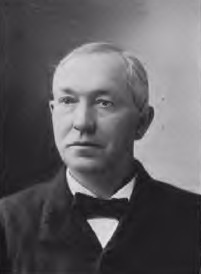 PERKINS, George
D., was born in Holly, Orleans county, N. Y., February 29,
1840. He learned the printer's trade at Baraboo, Wis. In 1860
he associated himself with his brother and started the
Gazette, at Cedar Falls, Iowa. PERKINS, George
D., was born in Holly, Orleans county, N. Y., February 29,
1840. He learned the printer's trade at Baraboo, Wis. In 1860
he associated himself with his brother and started the
Gazette, at Cedar Falls, Iowa.
On the 12th day of August, 1862, he enlisted as a
private soldier in the Thirty-first Iowa infantry. He was
mustered out of the service at Jefferson Barracks, Mo., on the
12th day of January, 1863. In 1869 he left Chicago, 111.,
where he had been connected with the service of the Northern
Associated Press, and settled in Sioux City, Iowa, where he
has since lived, and during that time has been editor of the
Sioux City Journal, the best newspaper property of Iowa.
He was a member of the Iowa senate in 1874-76; was
immigration commissioner under Governor Gear; was United
States marshal for the Northern District of Iowa, under
President Arthur; was elected to the Fifty-second Congress as
a republican, and re-elected to the Fifty-third, Fifty-fourth
and Fifty-fifth Congresses.
Mr.
Perkins is one of the strong and great men of the state and
nation, and it is a matter of regret that he requests so brief
a sketch.
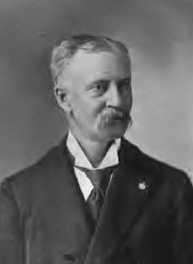 WARREN, Dr. John Nelson, of
Sioux City, is a native Iowan and a well-known physician of
northwestern Iowa. He is the son of Monroe Warren, a
blacksmith, who came to Iowa in the spring of 1844, first
locating in Davenport, but soon afterwards removing to De
Witt. Clinton county, where he has since resided. He was
married July 4, 1845, to Betsy Ann Saliss, who came to Iowa
with her parents from Albany, N. Y., in
1844. WARREN, Dr. John Nelson, of
Sioux City, is a native Iowan and a well-known physician of
northwestern Iowa. He is the son of Monroe Warren, a
blacksmith, who came to Iowa in the spring of 1844, first
locating in Davenport, but soon afterwards removing to De
Witt. Clinton county, where he has since resided. He was
married July 4, 1845, to Betsy Ann Saliss, who came to Iowa
with her parents from Albany, N. Y., in
1844.
Dr. Warren was born at DeWitt, Iowa, April 30, 1846,
and has resided in the state the principal part of his life.
He attended the public schools of De Witt and the Mt. Carroll, 111.,
seminary, from which he graduated in 1863. Following this he
entered Cornell college for a collegiate course, but in April,
1864, he enlisted in the Forty-fourth Iowa Volunteer infantry
as a private and served until September, 1864, when he was
mustered out at Davenport.
After being mustered out he took a course in Bryant
& Stratton's Commercial college, of Chicago, and, after
returning home, was clerk in the county clerk's office for one
year, when he accepted a similar position in the county
recorder's office. While in the recorder's office he commenced
work on the first set of abstract books of farm lands of
Clinton county, doing the work for Mr. Dennis Whitney, now of
Clinton.
In the fall of 1868 he commenced reading medicine under
the late Dr. Asa Morgan, of De Witt. In 1869-70 he attended
a first course in medicine in the medical department in the
University of Michigan and then entered the Miami Medical
college at Cincinnati.
Ohio, from which he graduated in March, 1871. Following
his graduation he received the appointment as assistant
physician in the hospital for the insane at Athens, Ohio,
which position he held for a period of one and a half years,
resigning in order to return to his home, where he opened an
office. In March, 1878, he located at Storm Lake, and was in
general practice there until October, 1889, at which time,
having received the appointment as chief surgeon for the Sioux
City & Northern railroad, he moved to Sioux City. Since
this he has devoted most of his time to surgical practice,
and, in order to better qualify himself for such work, he
attended, in the fall of 1883, the Post Graduate Medical
college, of New York city, and also took a course of private
instructions in abdominal and gynecological surgery under the
late Professor Dawson, of New York city.
Dr. Warren has been a life-long republican, but has
never aspired to any public office. He is a member of the
International Association of Railway Surgeons, State
Association of Railway Surgeons, an association which he
himself organized, the first meeting being held at Sioux City,
October, 1894. He was elected president at that time, and has
been chairman of the judiciary committee since retiring as
president of the association in 1895. He is a member of the
American Medical association, Sioux City Medical association,
Sioux Valley Medical association, being secretary of the
latter since its organization at Sioux Falls, S. D., in June,
1895. He is a member of the Surgical Society of the Chicago,
Milwaukee & St. Paul Railway company, and is chief surgeon
of the Sioux City & Northern railway. Sioux City, O'Neill
& Western railway, and local surgeon for the Chicago,
Milwaukee & St. Paul railway, and is also professor of
practice of surgery and clinical surgery in Sioux City College
of Medicine.
Dr. Warren was married June 27, 1877, to Mary V. M.
Hubbard at Lindon, 111.
They have three children: Alexis M , born 1879; Renita
Madge, born 1883; and Nelson Jay, born 1885.
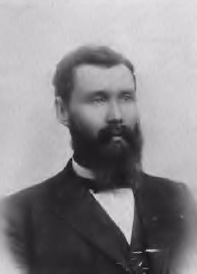 WHEELER, Hial Augustus, M. D. Among the many members
of the medical profession to whom the management of the Iowa
State university may point with pardonable pride is Prof. H.
A. Wheeler, for five years dean of the faculty of the Sioux
City Medical college, and at present filling the chair of
medicine, clinical medicine and neurology in that widely known
institution. WHEELER, Hial Augustus, M. D. Among the many members
of the medical profession to whom the management of the Iowa
State university may point with pardonable pride is Prof. H.
A. Wheeler, for five years dean of the faculty of the Sioux
City Medical college, and at present filling the chair of
medicine, clinical medicine and neurology in that widely known
institution.
He is the son of Silas and Jane P. Wheeler, both of
English and Scotch parentage, who are now living in La Grange,
111. There were three children besides Hial A. He was born at
Barton, Vt, June 20, 1854, where his early education was
acquired in the common schools. At the age of 16 he
was placed in the Freewill Baptist seminary at Lindon Center,
where he remained one year, then worked for a time as clerk in
manufacturing establishments in Boston and New York.
In 1873 he returned home and assisted his father, who
was engaged in the livery and stage business, until September
9th, at which time he started for the west. Stopping for a
time in La Salle county, 111., he followed the vocation of
school teacher, and in the spring of 1875 came on to Monona
county, Iowa, in a covered wagon, where he engaged in farming
and teaching for two years, while he continued the study of
medicine under local physicians. He entered the medical
department of the Iowa State university in 1878, graduated
therefrom in 1881, practiced at Riverside until June, 1883,
then removed to Onawa, where, for eleven years, he devoted
himself to his profession. During this time he purchased a
large professional library, and the hours not required by his
practice were spent very largely in study. The office of
county physician was tendered him, and he filled the same for
five years, but was obliged to give it up by reason of the
demands made on his time in other directions.
From September 1, 1887, to January 1, 1891, he was
senior member of the drug firm of Wheeler & Egli. In 1890
he compiled and published "Abstracts of Pharmacology," a work
prepared for the use of physicians, pharmacists, and students
of medicine and pharmacy, preparing for examination in
colleges and before state boards of examiners. Many thousand
copies of the work have been sold throughout the middle and
western states. In 1887 he conceived the idea of a college of
medicine for the northwest, and at once started the movement
which resulted, in 1890, in the establishment of the Sioux
City Medical college. He was the prime mover, one of the
original incorporators, and served as dean of the faculty
during the first five years of its existence. Although his
time is taken up with a large practice in Sioux City, he still
maintains an active connection with the institution, and now
fills a chair of the highest importance in the school.
The doctor is a member of the Missouri Valley Medical
society, and has acquired a reputation as lecturer upon
subjects pertaining to his profession. He was married to Miss
Mary C. Ingham, a native of Texas, September 27, 1876, and
they have four children: J. Rush, born in Iowa City, April 28,
1879; E. Ruel, born at Morse, Iowa, March 6,1881; A Ray, born
at Onawa, April 16, 1885, and Jessie J., born at Onawa, June
20, 1886. Both the doctor and his wife are members of the
Congregational church. He is a staunch republican, though not
active in politics.
The
information on Trails to the Past © Copyright may
be used in personal family history research,
with source citation. The pages in entirety may
not be duplicated for publication in any fashion
without the permission of the owner. Commercial
use of any material on this site is not
permitted. Please respect the wishes of
those who have contributed their time and
efforts to make this free site possible.~Thank
you! |